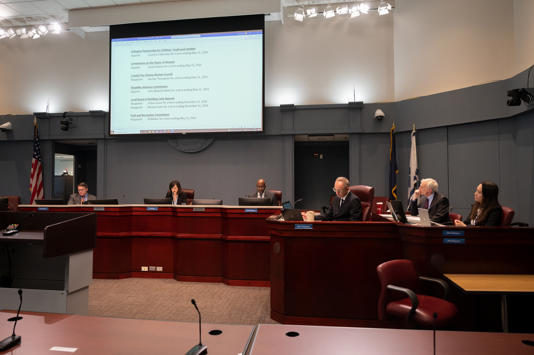Wheeler behind in Prince William County board chair primary
Deshundra Jefferson appeared to oust incumbent Prince William Board of County Supervisors Chair Ann B. Wheeler, holding a sizable lead in a Democratic primary fueled by strong backlash against the building of more data centers.
Jefferson, a communications specialist who is new to county politics, had gone after Wheeler’s efforts to expand the booming data-center industry in the more rural western part of the county, the commonwealth’s second-largest. In the Republican primary for board chair, Supervisor Jeanine Lawson (R-Brentsville) beat Kenneth Knarr.
Virginia primary elections 2023: Live results of the latest vote tallies
In neighboring Fairfax County, board chair Jeffrey C. McKay (D-At Large) beat Lisa M. Dowling in the Democratic primary.
No results are expected until Friday at the earliest in the Democratic primary for two open seats on the Arlington County Board, the first election in Virginia to be decided using ranked-choice voting.
Four of the six candidates — Maureen Coffey, Susan Cunningham, Natalie Roy and Julius D. “J.D.” Spain Sr. — drew the bulk of the first-choice votes, each receiving between 20 percent and 25 percent of the total. The field will be whittled down when all ballots are received later this week.
The primary contests were largely fueled by concerns over development in Northern Virginia and a rising cost of living caused by the economic fallout from the coronavirus pandemic, when area home prices surged and tax assessments increased.
Tensions over housing density and affordability were central to the races in Fairfax and Arlington, while in Prince William, voters opposed to data center development hoped to unseat Wheeler.
Jefferson said in a phone interview that she was surprised by her lead and apparent win. With more than 99 percent of the vote counted, Jefferson was leading by about 52 percent to 48 percent for Wheeler. The results, she said, send a strong message about voters’ feelings about development.
“We are a growing county and people want to have a say in how their communities change and evolve,” she said. “I have a more moderate approach to growth. I do welcome data centers, but they need to be in the appropriate places. They do not belong near homes or schools, and we’re not taxing them appropriately.”
McKay, meanwhile, said his primary win in Fairfax highlighted that “experience and competency still matters.”
“Even when you have to make hard decisions, people respect real leadership,” he said. “That’s what we’ve done in the past three and a half years and what I look forward to doing in the next four years.”
Wheeler, 62, came under attack over a proposal to create a “Digital Gateway” complex in a mostly rural section of the Gainesville area.
The county board, where Democrats hold a 5-3 majority, has targeted some rural areas for future development, stirring anger among residents who contend that more building will harm the environment.
Jefferson made that argument in her campaign and highlighted the thousands of dollars that Wheeler received from data-center developers and property owners who stand to benefit from the Digital Gateway.
She accused Wheeler and the board’s four other Democrats of ignoring constituents’ concerns about the potential effects of data centers, including noise produced by exhaust fans, and of not doing enough to keep the area affordable.
Wheeler — who raised seven times as much as Jefferson, with $251,000 — countered that increasing commercial tax revenue from data centers and other industries has allowed the board to consider lowering the residential property tax rate this year from $1.03 to $0.96 per $100 of assessed value. When accounting for rising property values in the region, that would leave a net-zero impact on the average homeowner’s annual tax bill, Wheeler said.
At the polls, the incumbent’s track record seemed to be enough for some.
James Witherspoon, who voted at Heritage Baptist Church in Woodbridge, recalled meeting Wheeler during a meet-and-greet at a neighbor’s house. He asked her firm questions on improving quality of life throughout Prince William.
“She gave me the very feelings that those same issues affect her,” Witherspoon said. “I could tell she was invested.”
Kyle Lyles, who reached the polls less than a half-hour before they closed, followed suit. He has never met Wheeler, but has followed her races since she took office in 2019 and said her track record made her the best candidate.
“It just felt like the best option,” he said.
If her lead holds, Jefferson would face Lawson in November, in a race that would likely affect how the Democratic-controlled board approaches the data center issue in the future.
Lawson, 53, focused on Wheeler during her campaign, leaving her supporters to attack Knarr over donations he’s made to Democrats and the fact that he stands to financially benefit from the Digital Gateway plan because his home is in that area.
Paulette Sellery, 74, cast her vote for Lawson at a polling site in the Gainesville area, saying she hoped to see increased regulations on data centers.
While Sellery had moved to Prince William because of the area’s open greenery and nature, she said, she worried that data centers were putting that into question.
“Everywhere I drive, I just see trees being leveled and these tall buildings going up,” she said.
Elsewhere in the county, Potomac District Supervisor Andrea O. Bailey (D) beat Kimberlee Jamale Short, while Supervisor Victor S. Angry (D-Neabsco) was facing Nate Murphy. The latter race was too close to call.
In Fairfax, Downing, a former CIA resources officer, cited as her main campaign issue the shortage of homes in the county that are large enough and also affordable for middle-income families.
She proposed zoning changes akin to those in Arlington, where areas designated for single-family homes would be targeted for multifamily dwellings.
Downing, 62, also attacked McKay over the board’s recent decision to increase supervisors’ salaries, which will take effect with the new board in January. And she said McKay’s regular use of a county vehicle instead of his own, including to commute to and from home, showed a lack of integrity.
But Downing struggled to gain traction with Democratic voters after entering the race just before the April candidate filing deadline.
McKay, 47, defended the county’s affordable-housing policies, noting that Fairfax has 4,000 affordable-housing units in the development pipeline and in the past year invested $94 million toward its goal of 10,000 such homes by 2030.
But, he said, he’d support expanding zoning to allow multifamily dwellings to be built in areas designated for single-family homes.
McKay also dismissed Downing’s attacks over the board’s salary increase — the first since 2015 — saying they’re intended to reflect the long hours put in by supervisors, including nights and weekends, and to attract a broader pool of candidates who might not have other sources of income.
He called the criticism over his use of a county car “sensationalism,” saying his job requires frequently traversing the county of 406 square miles for events and police incidents that sometimes run late into the night, which “would be a nightmare” to get county reimbursement for miles if he used his personal vehicle.
McKay — who far outraised Downing, with $301,000 — will face Republican Arthur Purves, head of the Fairfax County Taxpayers Alliance, in November.
In other Fairfax County races, Andres Jimenez was leading in the race for Supervisor Penelope A. Gross’s (D-Mason) open seat while James N. Bierman Jr. won the race for the seat being vacated by Supervisor John W. Foust (D-Dranesville).
Supervisor Daniel G. Storck (D-Mount Vernon) won his primary election contest against Maritza Zermeño and, in the Springfield district, Democrat Alberto “Albert” Vega won in the fight to take on Supervisor Pat Herrity (R) in November.
Fairfax County Sheriff Stacey Ann Kincaid beat Kelvin Garcia in the Democratic primary for that office.
Kincaid, who was first elected as Fairfax sheriff in 2013, had campaigned on expanding the office’s reentry programs for people leaving jail, aiming to create a reentry center in Fairfax County. She will face former sheriff’s deputy Jerry McMillian in the fall.
During her time as sheriff, Kincaid ended an agreement with federal authorities that kept people who potentially faced deportation in jail beyond the end of their criminal sentences. She also pointed to her work helping to create Diversion First, a program that steers people with mental health disorders away from jail.
In Arlington, six candidates were competing for two spots on the Democratic ticket in a race that hinged on lawmakers’ vote to allow the construction of duplexes, townhouses and small apartment buildings in neighborhoods that had for decades been reserved for single-family houses.
All county board members are elected at-large and serve staggered four-year terms, and two seats were up for election this year. Neither Chair Christian Dorsey (D) nor board member Katie Cristol (D) opted to defend their seat, leaving the field open. (The board members later vote among themselves to choose a chair and vice-chair each January.)
Yet any conclusions on whether the controversial move for more “missing-middle housing” had alienated or mobilized voters would have to wait.
Because the race is being conducted via ranked-choice voting — a first among publicly-run elections in Virginia — county officials must wait until all mail-in and absentee ballots are in to finish tabulating the first round of votes. That will not happen until Friday at noon.
A candidate must win more than 33.3 percent of the vote to secure victory, and with all other precincts reporting Tuesday night, no candidates appeared to be on track to cross that threshold just yet.
Coffey, Cunningham, Roy and Spain were on track to advance to the next round of tabulation.
The lowest vote-getter in this round — likely either Jonathan Dromgoole or Tony Weaver — will be eliminated from the next count. Ballots listing that person as the first choice will be redistributed to the second choice listed.
Acting Arlington Sheriff Jose Quiroz beat two challengers, James Herring and Wanda Younger, in the Democratic primary for that office.
Quiroz, who’s been serving as acting sheriff since January, is all but guaranteed to become the next Arlington sheriff. No Republican challenger has emerged for November’s general election, although independents had until Tuesday night to file.
In a brief phone interview Tuesday night, he said he was “grateful that the Arlington voters have supported the actions I have taken so far to create a safe and progressive in Arlington jail.”
He and his primary opponents all advocated for connecting people in jail with health resources after seven men died in the county jail in the past seven years under the leadership of Beth Arthur, who stepped down as sheriff earlier this year.
Quiroz, who said he wanted to bolster in-house medical services, recently announced a pilot program to bring biometric sensors to the detention center to help officials identify medical crises.



